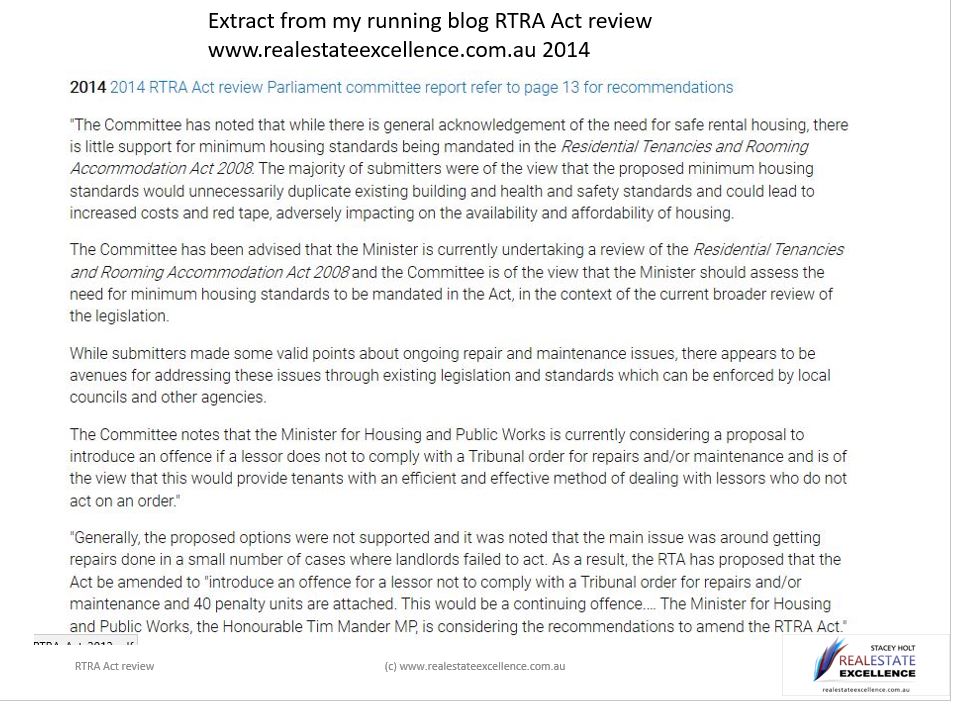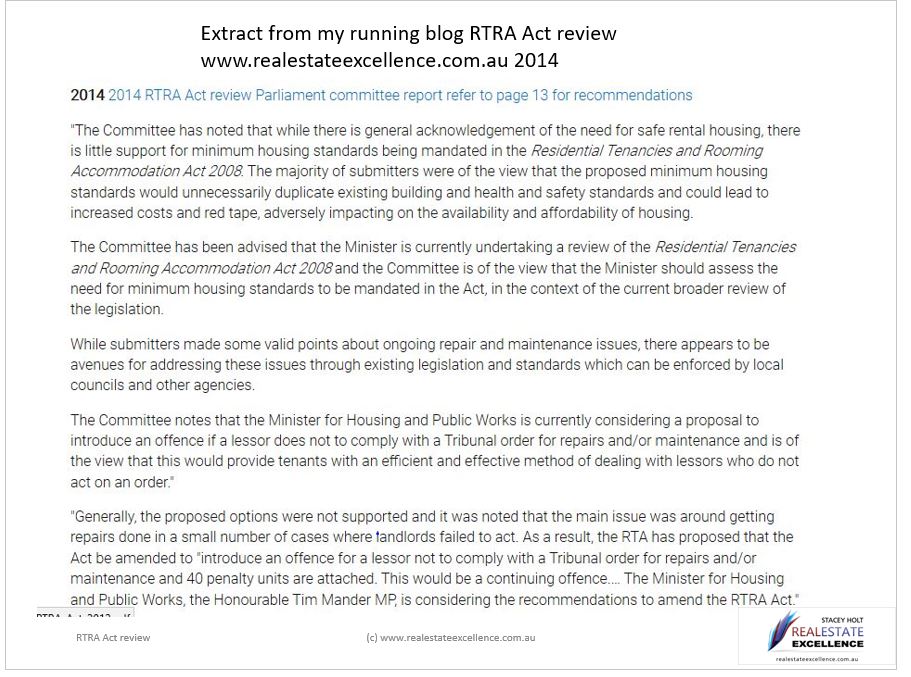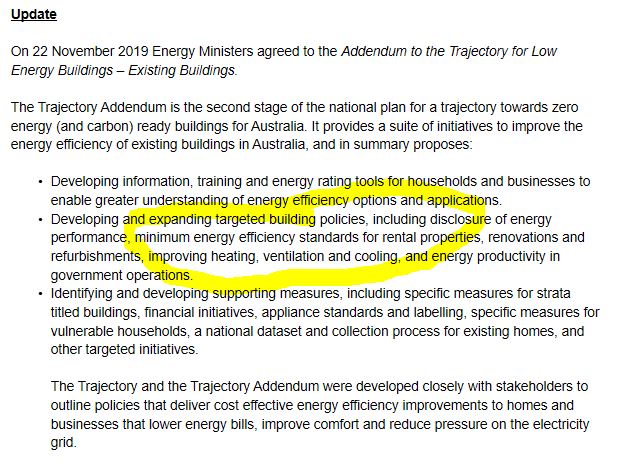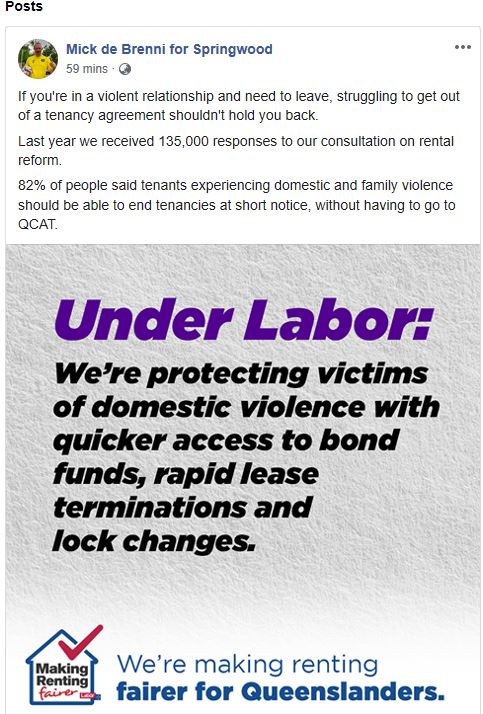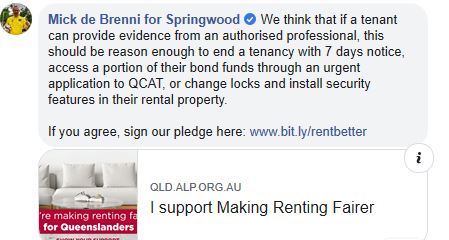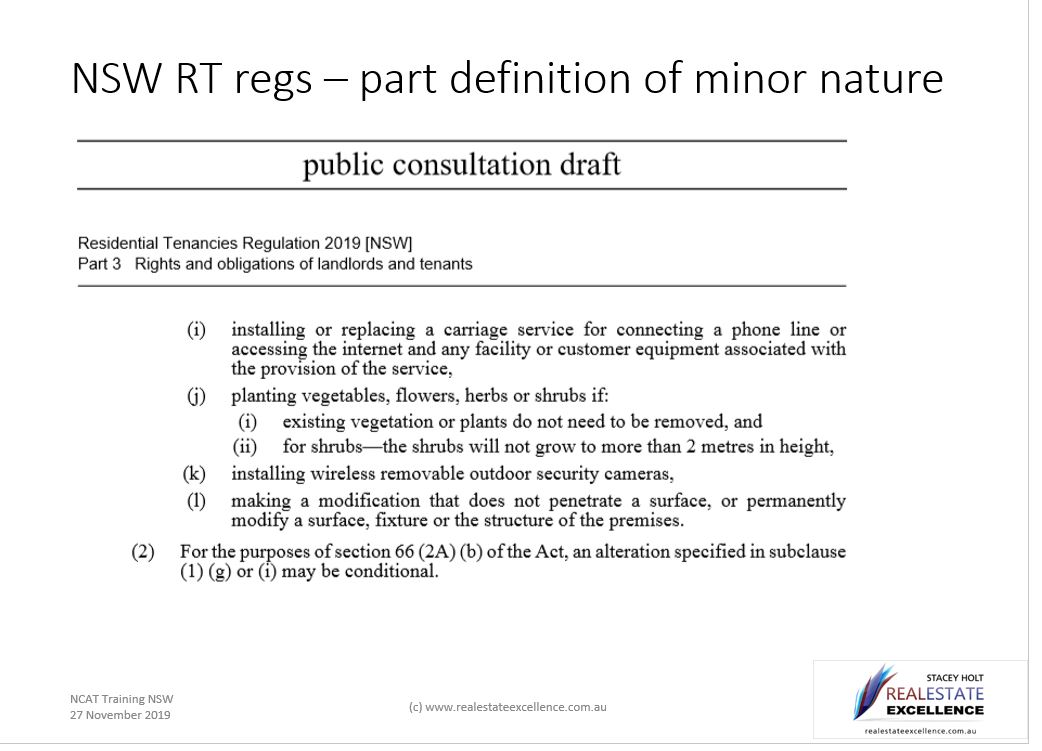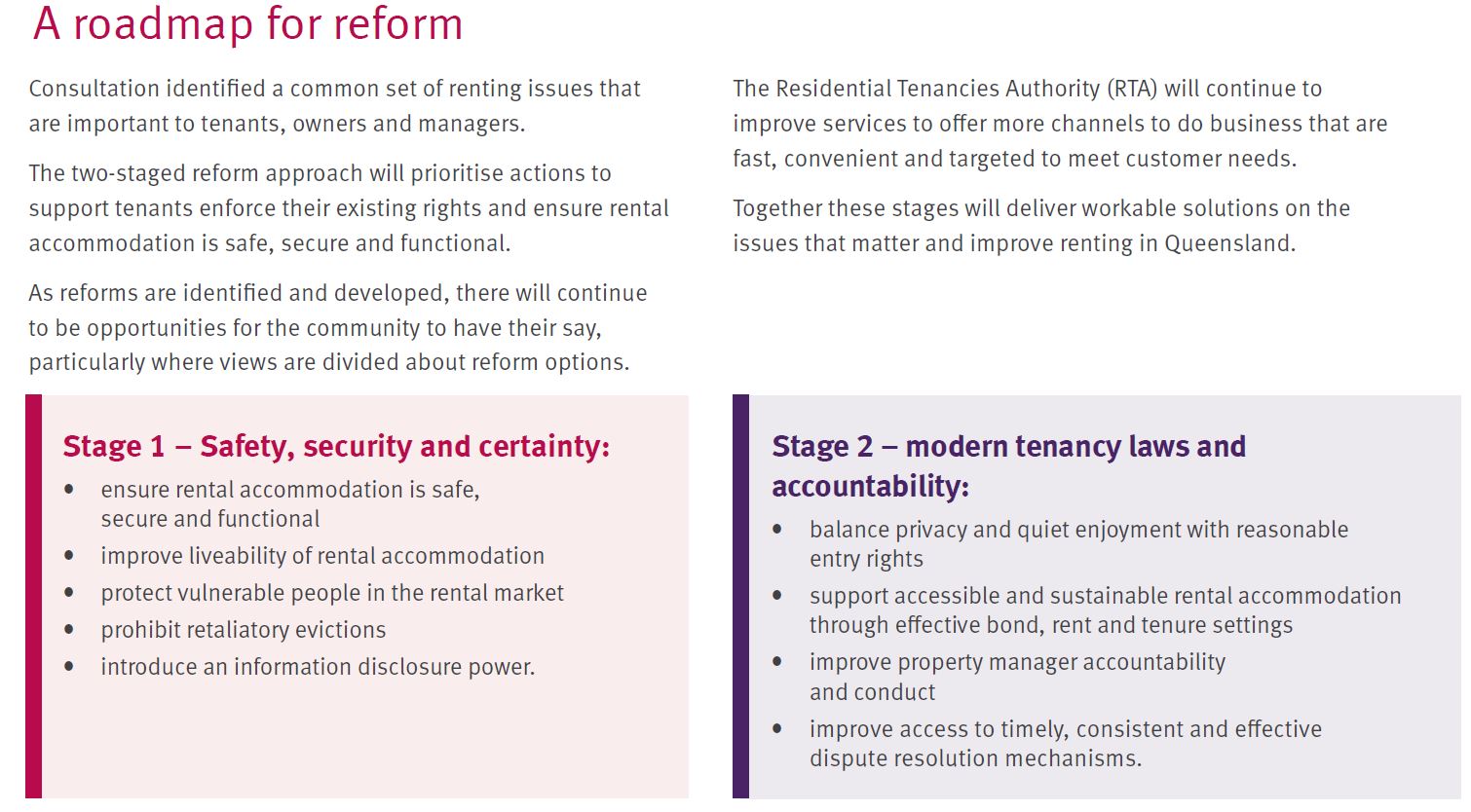RTRA 2019
December 12 2019 - My final statement and submission regarding the 'tenancy law reform' - RTRA Act review
Real Estate Excellence – Stacey Holt
Submission to the Queensland Labor Government
Regulatory Impact Statement
There should be further consultation after the closing of the RIS on 28th December 2019 with all the sector by the Government releasing the draft Act and regulations amendments. This would be a more democratic, reasonable and just way to truly achieve the outcome of making renting fair for all parties. The Queensland Civil and Administrative Tribunal (QCAT) which commenced in December 1, 2009 should also be reviewed as part of tenancy law reform. QCAT is made up of 24 tribunals; as part of this review, the tenancy arm of the Tribunal should be reviewed with tenancy law reform.
The Labor Government of Queensland has conducted the review of rental tenancy laws in Queensland in such an extraordinary way and have created a lot of uncertainty, and some fear for investors and the Real Estate industry.
The review carried out in 2018 was arduous, complex and lengthy. Most in the sector would not have had the time to keep up with the review for what turned out to be almost three months in length.
The reported statistic of 2% of the property management industry contributed to the 135 000 responses is not correctly represented given organisations such as my company Real Estate Excellence who has over 250 agency member offices, the REIQ, PPM Group and Real Estate Dynamics to name other substantial industry representation and membership.
The Minister for Housing posted on his social media page recently regarding taking the pledge relating to victims of domestic and or family violence in tenancies having an easier option to end tenancies. What was disappointing and has added to fear, possible anger and confusion by many in the sector, is the Minister called for people to take the ‘pledge’ and sign an online submission to support people in these terrible situations in relation to tenancy law. What was most disappointing, and quite a shock is the link to the Labor Party website to complete and ‘sign’ support, stated that by taking the pledge, people agree to ending revenge evictions, minimum housing standards, tenants right to make modifications and right to have pets, plus tenant right to end tenancies who are victims of family and domestic violence.
Strategies such as what have been used by the Minister, and other members of the Labor party have only escalated the confusion, fear and uncertainty. The RIS is meant to discuss the Government preferred option and call for feedback from all parts of the sector; the language and behaviour of Government during the review, and now the consultation stage shows a great bias towards any constructive feedback and a very unbalanced approach. I will discuss the matter of without grounds further shortly, however, it must be said that Government language verbally and in writing of stopping revenge and or retaliatory evictions is aggressive, embellished and without substantiated evidence it occurs. There appears to be only anecdotal evidence. In my review and knowledge of QCAT cases over these last ten years, there have been three decisions/appeals published regarding retaliatory eviction applications. Not all decisions or appeals are published. If this is such as widespread issue, where are the RTA statistics of fact from their call centre, and or dispute resolution?
This critical stage of consultation, and the Regulatory Impact Statement is lacking in detail and is disappointing. Whilst the 170-page document is detailed, it is lacking in detail.
What is needed for such as substantial change to legislation is detail. Where are the proposed amendments to review and comment on? The timeline provided by the Government states the next stage is the decision of the RIS and then the bill, I cannot see there will be further consultation to what is most important, the facts. The bill will then be introduced into Parliament.
Most of the RIS is unbalanced and not fair or just to all parties. There is one possible benefit for an investor being the proposed introduction of a notice to leave for serious breach. This has long been lacking in the industry, particularly with drug use, manufacturing and contamination being a concern within the sector. All other proposed reforms potentially benefit tenants only. This is not about the investor right or control; though some certainly feel disempowered and fearful about their investment of hundreds of thousands of dollars. A reasonable person would understand that fear and Government are attempting to dictate how an investor can decide the future of their investment. Investment is a private business.
Government should be focusing on purchasing land, properties, and creating affordable rental housing. There appears to be a deliberate intent of Government imposing their obligations onto private investors, plus increasing compliance, therefore cost. The smoke alarm law second tranche that began in 2017 is due to expire December 31, 2021. Investors have this cost, along with unknown other requirements regarding minimum housing standards. It is fear of loss of control, rights to make decisions about investments, and the affordability and risk of having such investments that is making the sector uneasy. The property is an investment for an investor and is not bought to fulfil a much-needed supply of social and affordable housing; that is the role of Government of which we pay substantial tax for.
I am not disputing property needs to be safe, and fit to live in. Ever since the RTRA Act was first put under review in 2012 by the former LNP Government, I have supported the existing laws as provided in my submission in 2018 when the review was carried out. A parliamentary committee stated in 2014 the law did not need to be amended as shown in extract below.
Public tax payer monies should have been focused on education and informing people of their rights (tenants), and investors of their obligations with what is currently in law. Instead, increased red tape and cost is being introduced.
Regarding the further proposed changes in the RIS regarding minor modifications, sections 217 to 219 cover tenant and lessor obligations and rights regarding making changes. There was and is no need for further legislation to complicate and confuse a matter which is already provided for in the legislation.
The sector should know at this stage of the review of such important legislation for many the following;
- What are the proposed reasonable grounds for a lessor to refuse a pet?
- What is the definition of minor modification?
- Why is the time frame for response only 7 days? A more reasonable time frame to allow for contact, discussion and negotiation is recommended to be 14 days.
- What detail will be in the legislation regarding returning the property in the same condition if minor modification without approval, or with fast-track approval?
- What are the minimum housing standards going to be?
- This is most disappointing given section 17A was inserted, and section 185 amended by the Government in November 2017. Given all this time, it is disappointing they have not been provided for a more constructive consultation. People do not know what they are disputing, agreeing to or in part agreeing to etc.
- Increased repair and maintenance provisions in the RIS state RTA prosecution as an option for non-compliance of QCAT repair orders. Again, there is no detail to constructive consult and or give feedback on this matter.
- Providing property managers authority regarding emergency repair authorisation is of concern given the PO Act and the OFT regulate the industry as opposed to the RTA. What is further of concern is section 22 of the AFA Act prohibits agencies from drawing trust account monies from a client’s ledger to pay accounts such as contractors without the clients written authority. Providing authority in the RTRA Act for property agents to authorise emergency repairs is possibly putting businesses at risk, as the industry legislation states the actual account cannot be paid without client written consent.
- Are the RTA going to also regulate property agents, and will there be amendments to the PO and AFA Act to allow and cover such proposed authorise in the RTRA Act?
In relation to Domestic and Family violence being a reason a tenant can provide notice is supported in part; the time frame for notice should be more reasonable and be 14 days. The ability for a cotenant to give 21 days’ notice when a victim terminates due to violence, should not proceed. Any people named on the tenancy contract who are on the lease have other ways to end the tenancy and if they are not the effected party, should not be given a provision to end a tenancy when they are not the victim.
Without grounds as a reason to end a fixed term tenancy has long been an emotive issue within the industry. The proposed preferred Government option of removing the without grounds as a reason to end a fixed term or period tenancy contract and replace with prescribed reasons is a highly controversial matter. What about the Australian Consumer Law (ACL) and the unfair contract terms; isn’t such proposed terms in a contract unbalanced and give more power to one party over another. The tenant should have a home; but it is not their property, it is the property of the investor.
An unintended consequence which appears to not have been considered is Landlord insurance and risk. Most landlord insurance policies provide no, or limited coverage for periodic tenancies. Common practice of industry since the notice to leave without grounds provision was increased to two months in 2009 is for lessors to be contacted by their agents around 2.5 to 3 months prior to a fixed term agreement contract expiring. The only reason this best practice procedure occurs is in the event the lessor wishes for the tenancy contract to end at the end of the fixed term agreement, and the two months’ notice can be provided to the tenant.
The RIS notes Queensland has some of the highest fixed term tenancy contracts in Australia. The reason this would long be the case is due to security of all parties, best practice and particularly, landlord insurance. If a tenant is offered a new agreement contract (lease renewal), and refuses to enter into a lease renewal, the tenancy reverts to a periodic. This leaves the investor in a serious position of risk due to reasons noted above; most lessor insurance policies provide limited and no coverage in the event of loss if a tenancy contract is periodic. Due to insurance and management of risk and security, tenants may be given a notice to leave without grounds if they do not wish to enter into a new tenancy agreement (leaser renewal).
Most tenants are good people, as are most investor lessors and agents. Bad things happen to good people meaning if the tenant does not want to enter into a lease renewal agreement, as they want the flexibility of a periodic lease, and the lessor does not have a proposed prescribed reason to end the tenancy, the investor is left in a dangerous position if the tenant situation and life changes. Examples include addiction, job losses, relationship dispute as opposed to violence and more. In the event the good tenancy ‘goes bad’, and the lease is periodic, there is great risk of loss to the investor. Is there a possibly of introducing a reason to give notice to leave is if the tenant does not enter into a fixed term agreement when offered? It appears tenants want security, and increased rights to make the investors property their home, but also want the flexibility. That is unfair to the investor who carries all the risk and cost of the investment property and is not a balanced approach of Government.
There are genuine concerns that investors may leave the market due to their loss of right to end a tenancy contract for their asset without grounds for the reasons stated in this submission. This is a possibly the Government cannot find afford to risk, given supply and demand drive rental market price, plus, the lack of social housing and homelessness. All parties most likely will suffer should the removal of without grounds proceed.
The solution to the minority of lessors who the Government call the ‘retaliatory and revenge eviction’ is to introduce a penalty unit provision if a tenant is provided a without ground notice in breach of section 291, with section 292 allowing for tenant to make complaint to the RTA if there is an alleged breach of the lessor in giving a notice to leave without grounds during a fixed term, and or periodic contract.
My understanding is Tenants Queensland have long expressed concern regarding section 292 in the tenant must ‘action’. The action being applying to tribunal within 4 weeks of being given a notice to leave and it is thought to be retaliation to a tenant utilising their rights, such as issuing a breach to lessor for alleged breach of their maintenance obligations under section 185.
The option of introducing a penalty for the issuing of a notice to leave without grounds is a win for all parties; and provides the tenant an effortless cost free option of complaining to the RTA for review of the notice to leave without grounds given in breach of section 291. The RTA should have the option of setting the notice aside, plus opposing a penalty if upon their usual investigation procedures finds the lessor is in breach.
There may be administration burden for the RTA; however, this should not deter the Government consideration given the serious risks involved for all parties should notice to leave without grounds be removed from the legislation as noted above. Given the number of QCAT decisions relating to retaliatory evictions in the last ten years, a substantial administration burden is not expected to occur for the RTA. This is a matter that could be reviewed in the years to come. The Government can fix this so-called widespread industry practice which is greatly disputed by introducing a penalty unit offence and ability to set aside a notice to leave without ground if it is found there has been a breach by the lessor of section 291.
Most of the unbalanced proposed reforms require an action of the lessor investor and or agent to take a matter to QCAT; such as refusing a pet (reasonable grounds unknown), and minor modifications not agreed to. As stated earlier, my understanding is Tenants Queensland have long had concerns that tenants have to take an ‘action’ such as apply to QCAT to enforce their rights they believe are being breached. It is proposed in the RIS that it will all fall on the investor lessor and or their agent to act for these matters. Again, this is very unfair and unbalanced approach.
Tenants have the right and should have to make the property their home. But the reality is, it is not their property. It is their home for the terms of the legal contract. Investors who are carrying all the cost and risk, should have a say as in any business transaction as to what occurs with their investment and not be dictated by Government. Government should create more housing and focus on policy for housing people to have homes for life as part of social housing.
There should be further consultation after the closing of the RIS on 28th December 2019 with all the sector by the Government releasing the draft Act and regulations amendments. This would be a more reasonable and just way to truly achieve the outcome of making renting fair for all parties.
Yours sincerely
Stacey Holt
Company Director
Real Estate Excellence
www.realestateexcellence.com.au
December 10 2019 - Tenants Queensland event
I was asked to speak as a panelist at a Tenant Queensland event "Generation rent needs a home" on the 10th December 2019. My notes for this event can be heard as a podcast here.
December 9 2019 - Minimum housing standards submission Real Estate Excellence
If you agree with my submission below, you are welcome to copy and paste, make any final edits and submission to the review by 28th December 2019. Give feedback to the Queensland Labor Government here.
I write in response to the Regulatory Impact Statement regarding proposed minimum housing standards.
As stated in my submission during the review in 2018 (further down in this submission), again, it is difficult to provide constructive and meaningful feedback in relation to proposed minimum housing standards as there is little detail provided in the RIS as to what the minimum housing standards mean. By not releasing the actual draft regulation at this point of the reform, Government are greatly disadvantaging investors by not enabling a constructive and fair consultation regarding proposed standards.
Under the proposal, all rental properties in Queensland would need to meet certain standards addressing:
- weatherproofing and structural soundness
- plumbing and drainage
- security
- the standard of repair of fixtures and fittings
- control of pests and vermin
- ventilation, lighting and privacy
- cooking and food preparation facilities
We are also recommending changes to ensure that property owners and managers comply with the Minimum Housing Standards and basic requirements for repairs and maintenance. These include:
- enhanced QCAT repair orders
- an increase in the time allowed for a tenant to return a condition report
- a requirement for property owners to provide key contact details for emergency repairs
- an increase in the value of emergency repairs that can be authorised by a tenant
- a new authority for property managers to approve emergency repairs, if the owner is unavailable
Given section 17A and amended section 185 have been in place since 2017, it is a great concern for transparency and a fair balanced approach, the Government have not released the regulations in draft as part of this stage of the rental reform review. It is hoped to have the draft regulations for further consultation before a Government decision is finalised moving forward.
22nd October 2018
It is difficult to provide constructive feedback to the “Property condition join the conversation’ discussion of the RTRA Act review when the regulations required to provide the actual definition of the minimum housing standards are not yet available. Given the amendment to section 185 and the introduction of section 17A as at November 2017 are already in play, further detail should be provided to the sector to allow for a more informed feedback. Any proposed and or draft regulations are needed to provide a constructive platform regarding the impact and benefit (or lack of) to the private rental sector in relation to the proposed minimum housing standards. The questions (as per the website below as at 18th October 2018) are too broad and need further explanation. It is assumed that part of the Government review expectation, is via the feedback provided from tenants, lessors and agents to the questions below, more information will be clarified for the sector moving forward before regulations are introduced.
185 Lessor’s obligations generally:
(1) This section does not apply to an agreement if –
(a) the premises are moveable dwelling premises consisting only of the site for the dwelling; and
(b) the tenancy is a long tenancy (moveable dwelling).
(2) At the start of the tenancy, the lessor must ensure –
(a) the premises and inclusions are clean; and
(b) the premises are fit for the tenant to live in; and
(c) the premises and inclusions are in good repair; and
(d) the lessor is not in breach of a law dealing with issues about the health or safety of persons using or entering the premises; and
(e) the premises and inclusions otherwise comply with any prescribed minimum housing standards applying to the premises or inclusions.
[s 185]
(3) While the tenancy continues, the lessor –
(a) must maintain the premises in a way that the premises remain fit for the tenant to live in; and
(b) must maintain the premises and inclusions in good repair; and
(c) must ensure any law dealing with issues about the health or safety of persons using or entering the premises is complied with; and
(d) if the premises include a common area—must keep the area clean; and
(e) must ensure the premises and inclusions otherwise comply with any prescribed minimum housing standards applying to the premises or inclusions.
Note—
See section 217 for the tenant’s obligations to notify the lessor about damage to premises and the need for repairs.
(4) However, the lessor is not required to comply with subsection (2)(c) or (3)(a) for fixtures attached to premises, and inclusions supplied with premises, (the non-standard items) if—
(a) the lessor is—
(i) the State; or
(ii) the replacement lessor under a community housing provider tenancy agreement; and
(b) the non-standard items are specified in the agreement and the agreement states the lessor is not responsible for their maintenance; and
(c) the non-standard items are not necessary and reasonable to make the premises a fit place in which to live; and
(d) the non-standard items are not a risk to health or safety;
and
(e) for fixtures—the fixtures were not attached to the premises by the lessor.
[s 186]
(5) In this section— premises include any common area available for use by the tenant with the premises.
Division 4 Prescribed minimum housing standards
17A Prescribed minimum housing standards
(1) A prescribed minimum housing standard means a standard prescribed by a regulation.
(2) A regulation may prescribe minimum housing standards for—
(a) a residential premises let, or to be let, under a residential tenancy agreement; or
(b) a rental premises; or
(c) inclusions for premises; or
(d) facilities in a moveable dwelling park (park facilities).
(3) A prescribed minimum housing standard may be for any matter relating to the premises, inclusions or park facilities, including, for example, the following—
(a) sanitation, drainage, cleanliness and repair of the premises, inclusions or park facilities;
(b) ventilation and insulation;
(c) protection from damp and its effects;
(d) construction, condition, structures, safety and situation of the premises, inclusions or park facilities;
(e) the dimensions of rooms in the premises;
(f) privacy and security;
(g) provision of water supply, storage and sanitary facilities;
(h) laundry and cooking facilities;
(i) lighting;
(j) freedom from vermin infestation;
(k) energy efficiency.
[s 18]
(4) If a regulation made under subsection (2) makes provision in relation to a matter and provision is also made in relation to that matter by, or under, any Act, the regulation—
(a) if not inconsistent with the Act, must be observed in addition to that Act; and
(b) if inconsistent with the Act, is, to the extent of the inconsistency, of no force or effect and that Act prevails.
Example of inconsistency between a prescribed minimum housing standard and an Act—
A prescribed minimum housing standard, that purports to require a lessor to keep residential premises and inclusions clean after the start of a tenancy, is inconsistent with the obligations of a tenant under section 188(2).
(5) A regulation may also prescribe how compliance with minimum housing standards is to be monitored and enforced.
(6) In this section— premises means premises mentioned in subsection (2)(a) or (b).
Extract from the review website below.
Property condition
Every Queenslander has a right to live in a safe, secure and sustainable home.
It’s important that rental properties across the state are fit to live in and stay in good repair throughout a tenancy.
Property owners must ensure rental premises and inclusions provide a safe environment for tenants, while tenants have a responsibility to look after the rental property, keeping it clean and in good order.
This week, we want to hear your experiences and ideas about minimum housing standards in a rental property, repairs and maintenance, and energy efficiency options to minimise cost of living.
Every Queenslander has a right to live in a safe, secure and sustainable home.
It’s important that rental properties across the state are fit to live in and stay in good repair throughout a tenancy.
Property owners must ensure rental premises and inclusions provide a safe environment for tenants, while tenants have a responsibility to look after the rental property, keeping it clean and in good order.
This week, we want to hear your experiences and ideas about minimum housing standards in a rental property, repairs and maintenance, and energy efficiency options to minimise cost of living.
Tell us what you think:
- What do you think are acceptable standards for the condition of rental properties?
- What standards of safety should Queensland rental properties be required to meet?
- What should happen if minimum standards are not met?
- How would minimum standards for rental accommodation impact you as a tenant, owner or manager?
Tell us what you think:
- What do you think are acceptable standards for the condition of rental properties?
- What standards of safety should Queensland rental properties be required to meet?
- What should happen if minimum standards are not met?
- How would minimum standards for rental accommodation impact you as a tenant, owner or manager?
Bottom of Form
Tell us what you think:
- What does ‘clean’, ‘fit to live in’ and ‘in good repair’ for rental properties mean for you?
- How could managing the ongoing repair and maintenance of rental properties be improved?
- How can we improve the way in which damage caused to a Queensland rental property is dealt with?
Tell us what you think:
- What does ‘clean’, ‘fit to live in’ and ‘in good repair’ for rental properties mean for you?
- How could managing the ongoing repair and maintenance of rental properties be improved?
- How can we improve the way in which damage caused to a Queensland rental property is dealt with?
Bottom of Form
Tell us what you think:
- How could energy and water efficiency of rental properties be improved?
- What would encourage energy and water efficiency features to be included in rental properties, like solar panels or water saving devices?
Tell us what you think:
- How could energy and water efficiency of rental properties be improved?
- What would encourage energy and water efficiency features to be included in rental properties, like solar panels or water saving devices?
Top of Form
Bottom of Form
Tell us what you think:
- How can housing design and safety measures be improved in the rental market?
- What reasonable modifications should tenants be allowed to make for safety reasons?
Tell us what you think:
- How can housing design and safety measures be improved in the rental market?
- What reasonable modifications should tenants be allowed to make for safety reasons?
With the limited information available without the regulations, the following feedback is hereby provided;
Whilst the focus and importance of having safe rental properties is paramount, the cost for compliance to the sector and the possible impact to the private rental market could be catastrophic to say the least to all parties involved, including tenants which may see rents rise to recoup the possible costs to investors.
Landlords (lessors) already have clear statutory obligations in relation to ensuring properties are safe and fit to live in through section 185. If landlords fail in their obligations, tenants could utilise their many rights to ensure the landlord meets their legislative obligation.
Tenants already have adequate rights when it comes to maintenance concerns of rental property particularly given the overarching provision of section 185 relating to landlord obligations. They can choose, depending on the situation one of more of the following;
- Breaching the lessor under section 185 of the RTRA Act
- Applying to the RTA dispute resolution via form 16
- If the matter is unresolved, apply to tribunal for an order about the matter
- Apply to tribunal via section 191 if the criterion is met
- Seek a rent reduction under section 94
It is strongly recommended before the proposed bill moves forward in relation to minimum housing standards, more information is provided to the sector to enable a more informed debate surrounding what the Government is proposing to be minimum housing standards for Queensland rental property.
Yours sincerely
Sent via email This email address is being protected from spambots. You need JavaScript enabled to view it.
Stacey Holt
Company Director
Real Estate Excellence Academy Pty Ltd
December 8 2019 - Removal of without grounds provision Real Estate Excellence submission
Important - Please watch if you’re in Queensland regarding the proposed removal of without grounds (reason) provision to end a tenancy agreement contract.
A huge unintended consequence that I’ll be adding to my feedback. Watch here.
Real Estate Excellence submission provided to Government regarding the proposed removal of notice to leave without grounds to end a tenancy. You are welcome to copy and paste and provide to Goverment in your own right should you agree.
Thank you for the opportunity to provide this submission in response to the Regulatory Impact Statement (RIS).
This submission relates to the Government preferred option to remove the without grounds provision of ending a tenancy in Queensland and replacing with prescribed reasons along with the existing provisions.
As per the submission provided during the review in 2018 (supplied further down this submission), there are further reasons why the Government need to consider another approach regarding the ending of tenancies.
An unintended consequence which appears to not have been considered is Landlord insurance and risk. Most landlord insurance policies provide no, or limited coverage for periodic tenancies. Common practice of industry since the notice to leave without grounds provision was increased to two months in 2009 is for lessors to be contacted by their agents around 2.5 to 3 months prior to a fixed term agreement contract expiring. The only reason this best practice procedure occurs is in the event the lessor wishes for the tenancy contract to end at the end of the fixed term agreement, and the two months’ notice can be provided to the tenant.
The Regulatory Impact Statement notes that Queensland has some of the highest fixed term tenancy contracts in Australia. The reason this would long be the case is due to security of all parties, best practice and particularly, landlord insurance. If a tenant is offered a new agreement contract (lease renewal), and refuses to enter into a lease renewal, the tenancy reverts to a periodic. This leaves the investor in a serious position of risk due to reasons noted above; most lessor insurance policies provide limited and no coverage in the event of loss if a tenancy contract is periodic. Due to insurance and management of risk and security, tenants may be given a notice to leave without grounds if they do not wish to enter into a new tenancy agreement (leaser renewal).
Most tenants are good people, as are most investor lessors and agents. Bad things happen to good people meaning if the tenant does not want to enter into a lease renewal agreement, as they want the flexibility of a periodic lease, and the lessor does not have a proposed prescribed reason to end the tenancy, the investor is left in a dangerous position if the tenant situation and life changes. Examples include addiction, job losses, relationship dispute as opposed to violence and more. In the event the good tenancy ‘goes bad’, and the lease is periodic, there is great risk of loss to the investor.
There are genuine concerns that investors may leave the market due to their loss of right to end a tenancy contract for their asset without grounds. This is a possibly the Government cannot find afford to risk, given supply and demand drive rental market price, plus, the lack of social housing and homelessness. All parties will suffer should the removal of without grounds proceed.
The solution to the minority of lessors who the Government call the ‘retaliatory and revenge eviction’ is to introduce a penalty unit provision if a tenant is provided a without ground notice in breach of section 291, with section 292 allowing for tenant to make complaint to the RTA if there is an alleged breach of the lessor.
Of my review and knowledge of all QCAT published decisions and appeals during the last ten years, my understanding is there are three known cases that involve retaliatory eviction. Not all decisions and appeals are published. It is an indication the matter of lessors giving a notice to leave in breach of section 291 may not be as widespread as stated by Government in the Regulatory Impact Statement, media statements and social media posts.
My understanding is Tenants Queensland have long expressed concern regarding section 292 in the tenant must ‘action’. The action being applying to tribunal within 4 weeks of being given a notice to leave and it is thought to be retaliation to a tenant utilising their rights, such as issuing a breach to lessor for alleged breach of their maintenance obligations under section 185.
The option of introducing a penalty for the issuing of a notice to leave without grounds is a win for all parties; and provides the tenant an effortless cost free option of complaining to the RTA for review of the notice to leave without grounds given in breach of section 291. The RTA should have the option of setting the notice aside, plus opposing a penalty if upon their usual investigation procedures finds the lessor is in breach.
There may be administration burden for the RTA; however, this should not deter the Government consideration given the serious risks involved for all parties should notice to leave without grounds be removed from the legislation as noted above. Given the number of QCAT decisions relating to retaliatory evictions in the last ten years, a substantial administration burden is not expected to occur for the RTA. This is a matter that could be reviewed in the years to come. The Government can fix this so-called widespread industry practice which is greatly disputed by introducing a penalty unit offence and ability to set aside a notice to leave without ground if it is found there has been a breach by the lessor of section 291.
22nd October 2018
Section 291 of the RTRA Act clearly sets out when a notice to leave without reason cannot be given to a tenant.
Section 292 protects tenants who believe a lessor has contravened the provision.
Therefore, there is no need to add increased legislation unnecessarily.
Investors should always have the right to lawfully terminate a tenancy without reason. If investors comply with legislation, a lessor should have the right of possession without having to state a reason. Tenants are protected if lessors act outside the legislation. This is fair and balanced for all parties.
291 Notice to leave without ground
(1) The lessor may give a notice to leave the premises to the tenant without stating a ground for the notice.
(2) However, the lessor must not give a notice to leave under this section because—
(a) the tenant has applied, or is proposing to apply, to a tribunal for an order under this Act; or
(b) the tenant—
(i) has complained to a government entity about an act or omission of the lessor adversely affecting the tenant; or
(ii) has taken some other action to enforce the tenant’s rights; or
(c) an order of a tribunal is in force in relation to the lessor and tenant.
(3) Also, the lessor may not give a notice to leave under this section if the giving of the notice constitutes taking retaliatory action against the tenant.
(4) A notice to leave under this section is called a notice to leave without ground.
Editor’s note— See sections 329(2)(j) (Handover day for notice to leave for premises that are not moveable dwelling premises) and 330(2)(l) (Handover day for notice to leave for moveable dwelling premises) for requirements about the handover day for a notice to leave given without ground for a periodic agreement.
292 Application to tribunal about notice to leave without ground
(1) This section applies if—
(a) the tenant is given a notice to leave without ground; and
(b) the tenant reasonably believes the notice was given in contravention of section 291.
(2) The tenant may apply to a tribunal for an order to set aside the notice.
(3) The application must be made within 4 weeks after the notice was given.
(4) On an application under this section, the tribunal may make the order sought if it is satisfied the notice was given in contravention of section 291.
Yours sincerely
Sent via email This email address is being protected from spambots. You need JavaScript enabled to view it.
Stacey Holt
Company Director
Real Estate Excellence Academy Pty Ltd
0423 018 539
December 6 2019
Important - Please watch if you’re in Queensland regarding the proposed removal of without grounds (reason) provision to end a tenancy agreement contract. A huge unintended consequence that I’ll be adding to my feedback. Watch here.
December 5 2019
It is interesting to note when changes to tenancy law regarding minimum housing standards were first raised in Queensland in 2012, the former LNP Government reviewed the RTRA Act in the 'usual way'. Discussion paper and released draft legislation. In 2014, the LNP Government at the time released the following. Of particular interest is the first paragraph. When LNP lost the election in January 2015, Labor ignored the Committee and other recommendations as shown below and proceeded to increase costs for investors in Queensland. Over the many years of providing submissions and contributing to the review of the RTRA Act in 2018, I still stand by the facts that current legislation in the Act protects tenants from the very small amount of rogue lessors who may not do the right thing. I have my submissions on this matter at my blog (scroll down to review). Alas, given section 17A was introduced into the RTRA Act regarding minimum housing standards in November 2017 by the Labor Government, plus the amendment of section 185 at the time, we are now just waiting for the regulations as the Act has already been amended for minimum housing standards.
December 4 2019
Watch a short video regarding proposed removal of the without grounds to end a tenancy provision here.
Watch a short video regarding proposed tenants right to have pets provision here.
December 3 2019
A 30 minute training podcast with workbook has been produced for Platinum PME system member offices regarding stage one of the RTRA Act review. For more information, listen to a podcast here
November 26 2019
I have been asked by a number of franchise groups and independent agencies to write submissions in relation to the RTRA Act review for a fee for service. Whilst I am most grateful to be asked, below is my response upon request regarding writing submissions for agencies/groups as a service.
Thanks for the thought and consideration. A ‘fee free’ option is to review my website, and past submissions of which the group/your agency are welcome to copy/paste and make any final edits.
My blog below runs in Date order. The review of the RTRA Act occurred last year. I made 13 submissions during the review in 2018 on behalf of my membership and industry.
The review part is over, and it is now the regulatory impact consultation. I am not saying it is too late, however, the key part for submissions was last year. Now feedback is being sought from Government regarding the preferred recommendations of Government as part of Stage 1 of the rental reforms - www.qld.gov.au/rentinginqld. The regulatory impact statement has preferred options of Government for each of the 5 themes as part of stage one; questions for response are asked as part of the preferred Government options. This stage ends on 28 December 2019.
November 22 2019
Calls for changes that could save renters up to $1400 a year
Renters could see their electricity bills slashed by up to $1434 a year if new measures being pushed by 40 community groups are supported.
Community, health and research groups including the Australian Council of Social Service (ACOSS) are pushing for new energy efficiency standards to cover rental properties.
Analysis has shown that the average house could save between $667 and $1434 a year if landlords invested $5000 in upgrades including a more efficient hot water heat pump, upgraded airconditioning and LED lights.
State and federal energy ministers are expected to consider the measures at a meeting on Friday, including a work plan to develop a rating tool for existing homes, and a national framework for mandated energy efficiency standards.
They are also expected to explore funding options for upgrades to social housing and for low income homeowners. Read more here.
November 21 2019
Watch a short video regarding the review here.
November 20 2019
Disappointed to see the Queensland Labor Housing Minister using ways such as below for people to visit this link shown and “pledge” their support for all of below, and using the proposed new Domestic Violence provisions as a way for people to make their “pledge”. The Minister posted comment below regarding Domestic Violence, and the comment following provides a link. The link is supporting all of the proposed changes, not Domestic Violence as indicated the post.
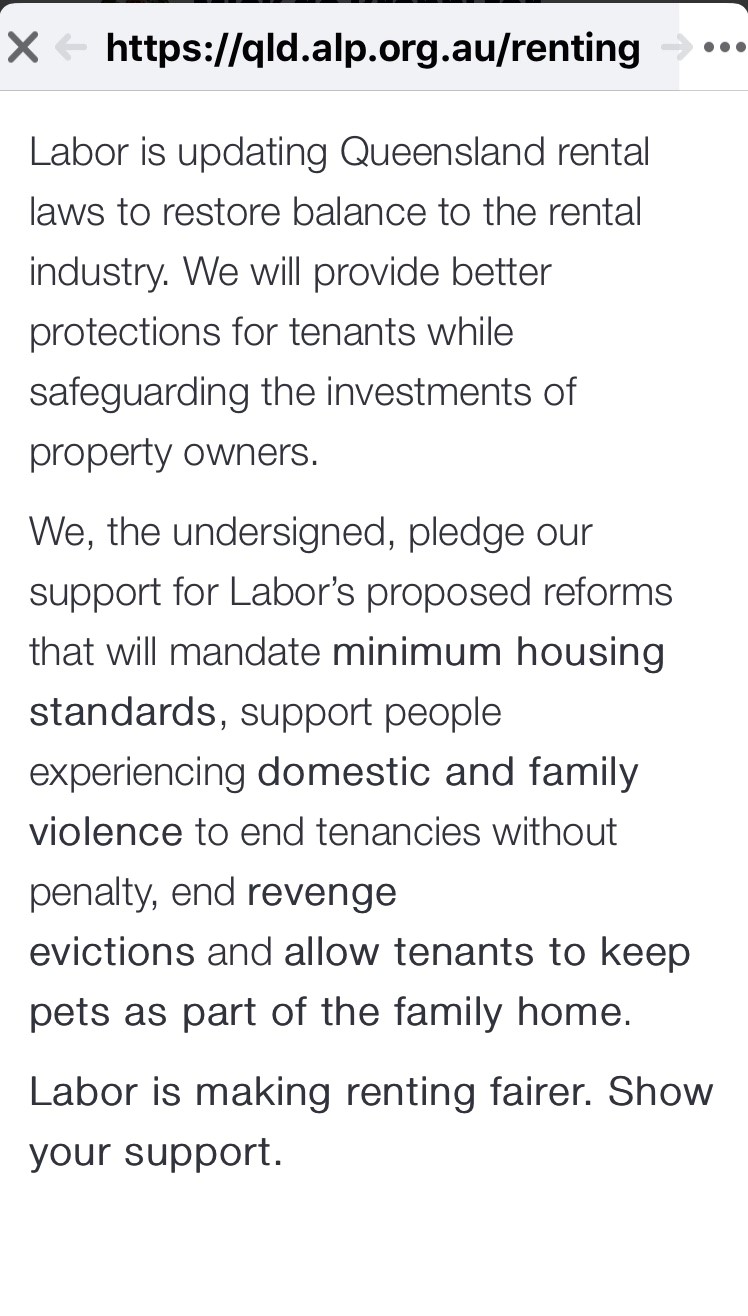
November 19 2019
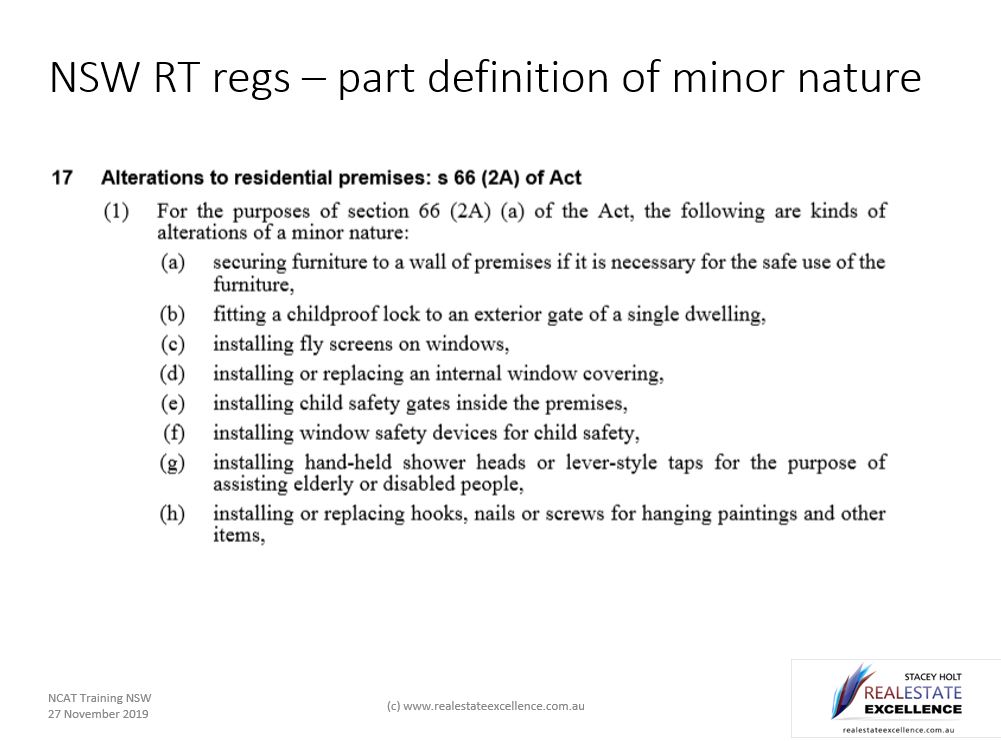
November 19 2019
Now is not the time to be negative. Cool heads must prevail. Since the release of stage one of the RTRA Act review (the consultation stage), many people are expressing outrage, and rightfully so, at the Queensland Labor Government regarding the proposed removal of an investor right to end a tenancy without grounds. The Government have used negative, emotive, unfair and unjust words often in relation to this matter. It is, and never was eviction, or evicting people without reason. It is ending a tenancy without grounds, termination of a contract, the end. There is a big difference.
Since the introduction of QCAT and published decisions and appeals in December 1, 2009, I have searched and saved every known tenancy case published. According to my records of almost ten years (QCAT is ten years old on 1 December 2019), there have been three matters published relating to retaliatory terminations/evictions. A reminder for Real Estate Excellence member offices that every known QCAT case published is at Member Online, folder 30 PME.
Cool heads again must prevail. Whilst the review is over, and we are at the consulting stage, it is not too late. I encourage all of industry now to inform their clients and use every means possible to inform people on what is being proposed. Whilst the Government statistics state 135 000 responses were received, the finer detail of that must be considered. 2% of responses were from agents. The review was carried out in many ways, including booths in shopping centres, social media and ‘pop up stalls’. I was, and still am very critical of the way the review was carried out as noted in my date order running blog.
You are welcome to use my submission to send to Government as part of the consulting stage. Please email me, or copy/paste, make any of your own edits from my blog. We have until December 28, 2019 to have our say. My submission can be found further on this blog (date November 17 2019), or here. The next stage is the draft legislation.
November 18 2019
The RTA are not carrying out the review as such; The Department of Housing are carrying out the review. Whilst the RTA is part of this Department, they are not conducting the review process.
Email received from Department of Housing and Public Works 3.15pm below.
|
Help shape Queensland's tenancy laws A review of Queensland’s tenancy laws is underway to ensure the rental needs of Queenslanders are met now and in the future. With more Queenslanders renting, and renting for longer, it is important that tenancy laws support individuals and families to find a safe, secure and sustainable place to call home. These laws also need to protect the investments of property owners, who provide much needed housing for an increasing number of Queenslanders. More than 135,000 responses were received during last year's Open Doors to Renting Reform consultation. We heard that Queenslanders want to feel safe and secure in the rental market, either as a tenant enjoying the property as their own home, or as an owner protecting the property as their investment. While a common set of renting issues were identified as important for all stakeholders, views about how Queensland’s tenancy laws should address these issues were diverse. Our Reform Roadmap outlines our response to the consultation findings and sets out a two-stage approach to a better renting future for Queensland. We’ve developed a Consultation Regulatory Impact Statement to seek feedback on options to change Queensland’s tenancy laws, including any potential impacts. There are five priority areas that you can provide feedback on:
Your feedback on the Consultation Regulatory Impact Statement will inform future policy decisions made by the Government to ensure we get tenancy law reforms right. Submissions can be made online or by post. The consultation is open for six weeks and all submissions must be received by 5pm AEST, 28 December 2019.
|
||||||
|
November 17 2019
The Consultation Regulatory Impact statement released on the 16th November 2019 (below) proposes the removal of the without grounds provision from the RTRA Act. Read more, and suggestions on what investors and industry can do now, click here. Listen to podcast on this matter here.
November 17 2019
The Consultation Regulatory Impact statement released on the 16th November 2019 (below) proposes the right of tenants to make minor alterations to a rental property. Read more, and suggestions on what investors and industry can do now, click here. Listen to podcast on this matter here.
November 16 2019 - Stage 1 of RTRA Act review released
Listen to a podcast regarding the RTRA Act review stage one here.
The Queensland Government have released the first stage proposed consultation report to the RTRA Act. As noted below, the review and future changes are proposed to be carried out in two stages.
Members of Real Estate Excellence; More information will be provided to members Monday 18th November via email as part of the "as it happens member update' service. Members will be provided with fact sheets, quick guides and more. A new folder at Member Online has been created called RTRA Act review stage 1.
Media Statements JOINT STATEMENT
Deputy Premier, Treasurer and Minister for Aboriginal and Torres Strait Islander Partnerships
The Honourable Jackie Trad
Minister for Housing and Public Works, Minister for Digital Technology and Minister for Sport
The Honourable Mick de Brenni
Saturday, November 16, 2019
Renting reform provides roadmap to save lives and curb domestic violence
The Palaszczuk Government has announced its plans to ensure safety and fairness in the Queensland rental market, after a huge response to community consultation.
Minister for Housing and Public Works Mick de Brenni said the response to consultation had been massive.
“It’s a sign of how strongly the community feels about renting that we’ve seen over 135,000 responses to our request for feedback through Open Doors to Renting Reform,” Minister de Brenni said.
“Through that process, we’ve identified three key areas for reform:
- Safety and security;
- Protection against domestic violence; and
- Protections if renting with pets
“We have considered evidence of some truly harrowing stories of safety issues in rental properties.”
Deputy Premier, Treasurer and Member for South Brisbane Jackie Trad said that the Palaszczuk Government was looking at a comprehensive makeover of tenancy laws that will set the rules that provide certainty for tenants, landlords and property managers.
“Across Queensland, more than one in every three households rent, but in some areas like the inner city, that figure rises to three in every five,” Ms Trad said.
“Tenants in my community and across Queensland are entitled to feel safe in their home, regardless of whether they own or rent.
“At the same time, we know that rental property owners need safeguards to protect their investment that provides much needed housing for an increasing number of Queenslanders.”
Minister de Brenni said the experience of Lyn and Ken Diefenbach who have advocated for prescribed minimum housing standards after the tragic death of their granddaughter Bella, was a driving factor for reforms to Queensland’s legislation.
“No parent should have to lose their child,” Minister de Brenni said.
“Regardless of where you live, every Queenslander deserves a safe, secure and sustainable place to call home.
“The Palaszczuk Government will deliver lifesaving reforms that see minimum standards adhered to, that keep Queenslanders safe, healthy and happy in their homes.”
Mr de Brenni announced that the Palaszczuk Government was releasing a roadmap detailing its staged approach to ensure that the proposed laws are fair for everyone.
The Palaszczuk Government will be seeking input into a Regulatory Impact Statement over the next 6 weeks.
Go to: www.qld.gov.au/rentinginqld to read the Better Renting Future Reform Roadmap to have your say on the proposed reforms.
ENDS
Media contact:
Deputy Premier’s Office: Geoff Breusch 0417 272 875
Minister de Brenni’s Office: Rosie Gilbert 0466 834 330
The above sourced from statements.qld.gov.au 16th November 2019
The below information has been sourced from qld.gov.au/rentinginqld. Stage 1 has been released as part of a Consultation Regulatory Impact Statement. The 5 key areas of reform are noted below and are detailed in the Consultation Regulatory Impact Statement. Stage 2 is expected to be released later in 2020. The proposed legislative amendment bill is the next part of the process to come.
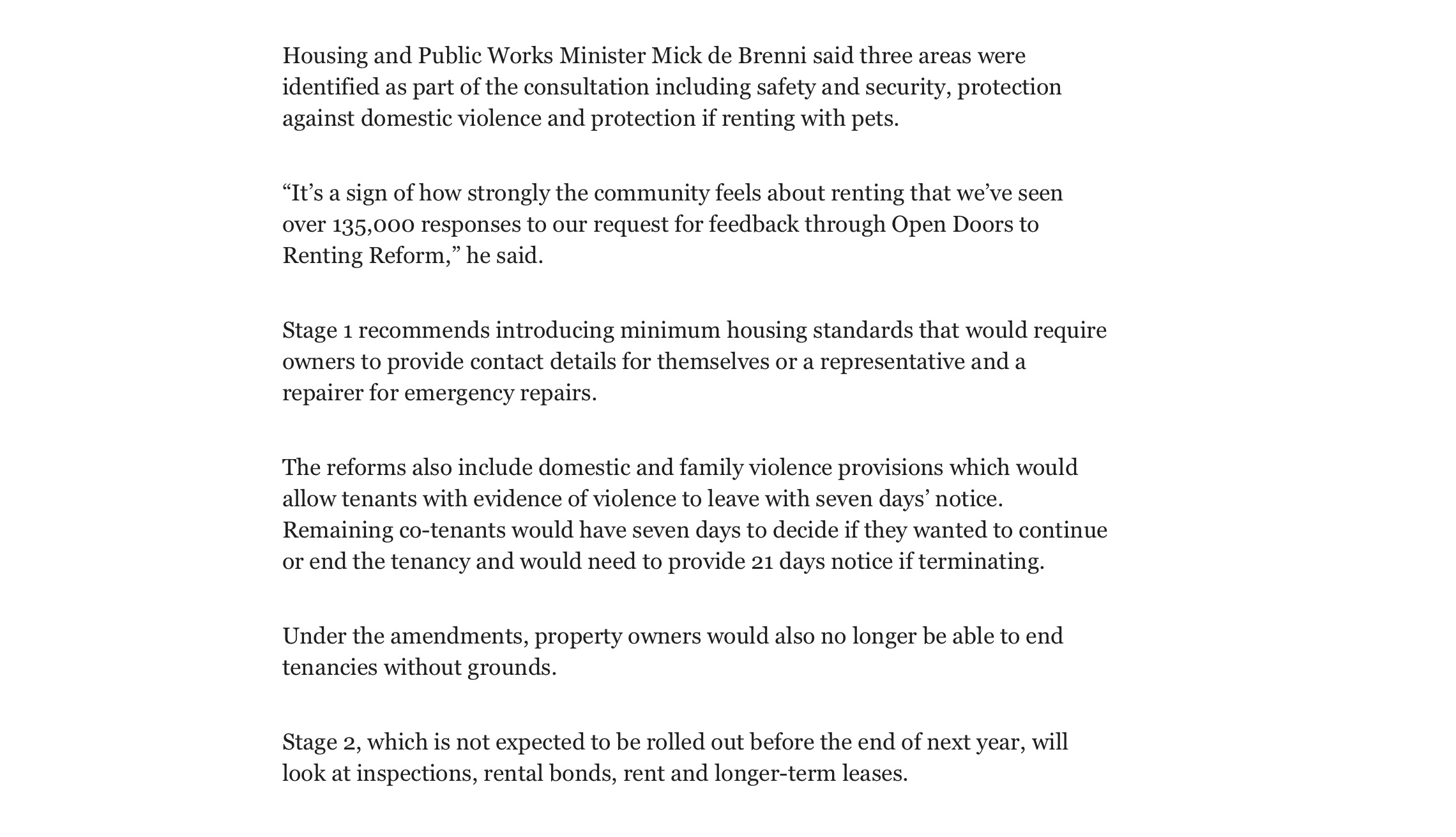
The above has been sourced from www.couriermail.com.au 16th November 2019.
April 12 2019
An update regarding the review has been posted in the Private Real Estate Excellence members group after I had discussions with Housing and Policy people.Real Estate Excellence member offices FB group Queensland member office private group here
All members will receive the review update with the May member update email service. Members who are not on social media, and would like an update before the May service, please email to receive. Contact us here.
April 2 2019
Click here to listen to Podcast by Stacey Holt regarding minimum housing standards.
March 20 2019
Click here to review a short video update regarding the review
March 7 2019
Email sent to our Bundaberg, Gladstone and Townsville mailling list regarding the solar panel rebate trial. Read useful information at the link below
Solar for Rental trial - Link HERE
March 5 2019
The Honourable Dr Anthony Lynham - Minister for Energy and Resources
Solar option on the table for tenants and owners
Up to 1000 landlords and their tenants have the chance to team up and cut power bills and emissions under a trial scheme in Bundaberg, Townsville and Gladstone.
Speaking from Bundaberg, Energy Minister Dr Anthony Lynham said the State Government was trialling rebates of up to $3500 to encourage rental property owners and their tenants to go solar.
“A typical household could save between $400 and $500 even after a $10 per week rent increase,” he said.
Under the scheme, tenants and owners must agree to having rooftop solar installed. The owner receives a rebate of up to $3500 to install solar and any rent increase must be fair and reasonable and agreed by both parties.
“This trial is all about giving tenants the opportunity to save on their power bills and their carbon emissions similar to the other 500,000 Queenslanders who are enjoying the benefits of solar,” Dr Lynham said.
“Queensland has one of the highest solar penetration rates in the world, with solar rooftop panels on one in three households.
“This trial is to encourage more renters and landlords to work together in reducing energy consumption through sharing the value of installing solar systems.
“Most importantly, the government rebate will only be available if the tenant and property owner have agreed to a fair rent increase, offset with power bill savings.”
Tenants Queensland chief executive officer Penny Carr said it was important that solar should not be confined to just those who own their home.
“Solar in rental properties is commonly overlooked by Queensland’s landlords, so it’s fantastic to see the Queensland Government helping tenants access the benefits of solar,” Ms Carr said.
“I encourage both landlords or tenants that are interested in lowering their living expenses and breaking into the solar market to get involved.”
The trial will run in Bundaberg, Gladstone and Townsville until June 30, 2020, or when the $4 million funding has been allocated.
“This trial is another chapter in our Affordable Energy Plan which continues to place downward pressure on electricity prices and this time we are focussing on tenants,” Dr Lynham said.
“We have worked with industry and stakeholders including Tenants Queensland and the Real Estate Institute of Queensland to establish this trial.
“If owners and tenants take up the challenge, this will also help expand our growing renewable energy sector which continues to create jobs and drive economic growth.”
To be eligible to apply for the Solar for Rentals trial:
- The property must be a house, townhouse or duplex located in Bundaberg, Gladstone or Townsville.
- The house must have its own roof space and it must be rented for less than $350 a week.
- Landlords and tenants must also both agree to a fair increase in rent and sign a new 12 month lease agreement.
For more information visit www.qld.gov.au/community/cost-of-living-support/concessions/energy-concessions/solar-for-rentals-trial/
[ENDS]
Media contact: Jan Martin 0439 341 314
7th January 2019 - Podcast regarding the review Click here to review podcast and link to listen anytime
17th January 2019 - The Government released a survey (email sent below regarding the survey regarding the review).
|
How can we improve our community consultations? The Queensland Government's Open Doors to Renting Reform community consultation was held over nine weeks from 30 September to 30 November 2018. We asked Queenslanders to share their renting experiences and ideas on how to improve renting in Queensland. Thank you for taking the time to have your say during the consultation. Input from the Queensland community was significant with more than 130,000 responses received - but we want to keep improving our community consultations. You can help us by completing a short survey and sharing with us how you heard about the Open Doors to Renting Reform consultation, what worked for you and what didn't. An independent research agency, Kantar Public, has been commissioned to undertake this survey on behalf of the Queensland Government. The survey will take about 10 minutes to complete. The survey is now open and will be available to complete until 5pm on Friday 25 January 2019. To begin the survey, please click on the link below: Take the Open Doors to Renting Reform evaluation survey (or copy and paste the link into your browser) https://ss.ktrmr.com/mrIWeb/mrIWeb.dll?i.project=Cvkpn&s=GEN24&id=1&chk=na&aar=1&pid=auto&rs=1 Information provided in the survey will be treated confidentially and if released, survey findings will not contain information that can be used to identify individual respondents. This market research is carried out in accordance with the Information Privacy Act 2009 (Qld). Thank you for taking the time to complete this survey. We appreciate your feedback.
|
||||||||
|
Join the conversation |
||||||||
| You have been sent this email because you participated in the Open Doors to Renting Reform consultation and indicated that you would be willing to be recontacted. The information collected will only be used for the survey described above conducted by Kantar Public Australia. The survey is being carried out in compliance with the Information Privacy Act 2009 (Qld) and your responses will be kept strictly confidential. Kantar Public is an international market research company and is a member of the Association of Market and Social Research Organisations (AMSRO) and Australian Market and Social Research Society (AMSRS). Kantar Public abides to the professional standards including AMSRS Code of Professional Behaviour and EOWA Guidelines. For more information about the organisation, please visit: http://www.kantar.com/public/ |
